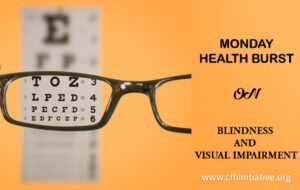MONDAY HEALTH BURST
MONDAY HEALTH BURST – BLINDNESS AND VISUAL IMPAIRMENT
Blindness is a complete or partial loss of vision. It is presenting visual acuity of 3/60 or less. Visual impairment on the other hand is often defined as a best corrected visual acuity of worse than 20/40 or 20/60. These could be cataracts, the infectious river blindness, trachoma, glaucoma, diabetic retinopathy, uncorrected refractive errors, and some cases of childhood blindness.

There are variations in the causes of visual impairment across countries. For example, the proportion of visual impairment attributable to cataract is higher in low- and middle-income countries than high-income countries. In high income countries, diabetic retinopathy, glaucoma and age-related macular degeneration are more common. Also, the leading cause of vision impairment among children in low-income countries is congenital cataract, whereas in middle-income countries it is more likely to be retinopathy of prematurity.
The categories of people at risk for blindness include people with eye diseases, such as macular degeneration and glaucoma, people with diabetes, stroke, people undergoing eye surgery, people who work with or near sharp objects or toxic chemicals, and premature babies. However, according to World Health Organization (WHO), more than 1 billion people worldwide are living with vision impairment because they do not get the care they need for conditions like short and far sightedness, glaucoma, cataract in time. This World report on vision by WHO estimates that 80% of visual impairment is either preventable or curable with treatment.
Many people with significant visual impairment benefit from vision rehabilitation, changes in their environment, and assistive devices. In some cases of vision impairment, use of eyeglasses, contact lenses, surgery, and medication may help restore vision, but in the case of irreversible partial or complete blindness, rehabilitation is recommended. Children using glasses are advised to go for medical checkups annually, glaucoma patients for monthly checkups, and people without any confirmed eye problem to go for eye check-up atleast once in 6months.
Monday Health Burst is an initiative of Centre for Family Health Initiative (CFHI) to tackle issues of basic health concerns. Join us every Monday for more health-related articles on all our social media platforms.
MONDAY HEALTH BURST Read More »
